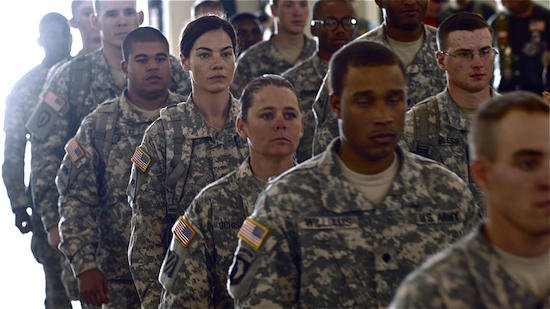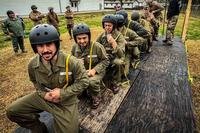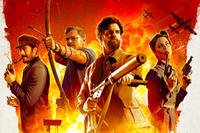
Most military-themed movies we cover around here either celebrate the actual awesomeness of special forces and their missions or are really just low-budget action '80s-style movies with some United States military logos slapped on for credibility. Fort Bliss aims to tell a story far more connected to the everyday reality faced by most of the men and women who serve.
Michelle Monaghan plays Maggie Swann, an Army medic who's also a single mother. She returns from duty in Afghanistan to discover that her ex-husband is getting remarried and that her five-year-old son doesn't remember his mother. The movie portrays her efforts to reconnect with her son and balance her family obligations with the love of her job.
Maggie makes career decisions no different than the ones made by thousands of men who serve but the sacrifices that go into those decisions are intensified by the fact she's a mother instead of a father. The film doesn't delve into the breakdown of her marriage, treating a dissolved relationship in a matter-of-fact way that's probably closer to the life experiences of a lot of divorced people. There are flashbacks to sexual harassment in Afghanistan and a surprise redeployment that exacerbates her family issues.

Fort Bliss is a movie that should find a strong audience in the military but it also aims to explain the realities of military life to a broader audience. We talked to director and screenwriter Claudia Myers about the film.
What inspired you to tell the story of a single mother serving in the military?
The idea came from my work on military training films and hearing the stories of soldiers who had come back. What sparked my interest in this story in particular was talking with a single father who had deployed a couple of times. Because the boy's mother wasn’t around, he left his son with his neighbors.
The project I was working on at the time had nothing to do with single parenting. His story just stayed with me and I guess it sparked my interest in stories about soldiers who are also parents. As a mother myself, I was drawn to the experiences of single mothers in the military and how they reconcile the demands of these two very different worlds. That was the beginning of the journey.
There's this whole other level of sacrifice that I think is not very well understood or recognized by the broader public, and I counted myself among those, so I felt like it was a story that needed to be told.

Talk about how you get a movie like this made.
Well, first of all, I didn’t just write the script. As someone without a military background, I felt like I wasn’t equipped to write the script,. I needed to learn much more about the world I was trying to portray. I obviously had a sense of the story I wanted to tell and how I would structure it, but I didn’t know nearly enough about the psychological reality that I wanted to show.
I developed the script over several years as I was seeking out other work that would give me access to the military and access to having kind of candid conversations with them. So I did another training script actually for a large-scale project for the Army Medical Department about combat stress and post-traumatic stress. I also did a couple of documentaries for the Department of Veteran Affairs. One was about polytrauma, tracking the experiences of three severely wounded soldiers coming back from Iraq and how each charted a path to recovery or at least to regaining some semblance of a normal life, if that was possible.
The other film I made that helped me develop the script for Fort Bliss was a documentary, a half-hour program about the evolution of women's roles in the military since World War II. One of the subjects I profiled in that piece was an Army Medic. And not coincidentally, because I was interested in medics at that point and got to speak to several of them, honing both my understanding of the fictional world that I was portraying and getting a better understanding of how women's roles have evolved and changed in a relatively short period of time.
%embed1%
It took about five years until I felt like the script was at a place where I was happy with it. One of the strategies I had for getting the film made the way I wanted to was to get Army support for the project, which I did by contacting the main public affairs office in Los Angeles and starting the dialogue and having them review the script.
It was a lengthy process and there were a lot of approvals that the script and the project had to go through. Ultimately I think the Army chose to support it because it showed what they felt was a realistic portrayal of the post-deployment experience and sort of the impact it has on the family. To their credit, they supported the project even though there was some difficult issues raised by the story and never asked me to make any changes.
That took a better part of a year. My film was financed with private equity, so it was truly an independent project. Knowing that we had Army support gave us kind of another leg up. We had this big logistical resource. We had access to film on post, could access the vehicles and had subject-matter experts to advise us during production so that things looked right, something that was of great importance to me and was also important to the Army, of course.
The other major element is attaching a star cast to the project. Getting Michelle Monaghan to commit to playing the role of Maggie was also instrumental. I think the strong script and the fact that it was a story that hadn't been told, along with the military support and commitments from actors like Michelle Monaghan and Ron Livingston were what propelled us into raising the money and going into production.
The cast is beyond my wildest dreams. You know they're all so talented and I think – I guess once it looked like the project was going to move forward, it was – I think people just were drawn to the script on a basic level. And then of course when you have actors like Michelle and Ron, who doesn’t want to play opposite them? So it was kind of – you know once you start to get momentum, it kind of builds and that’s how we got the level of cast that we did across the board.

Movie distribution is changing pretty rapidly. When we first started covering films at Military.com, a movie like “Fort Bliss” would’ve opened in a couple of theaters in New York and Los Angeles and maybe, a few months down the line, would be available on home video. Your film is available on demand at the same time it’s playing in theaters. What’s that experience like for you as a filmmaker?
The film opens on Friday the 19th at the AMC Burbank 8, AMC Times Square in New York, and the Grand 10 in El Paso. And in addition and simultaneously with those theatrical releases, the film is going to be available on demand pretty much everywhere in a multitude of platforms. And so as a filmmaker it's kind of a new experience for me. I think it's exciting.
Do I prefer that people see a film in a theatrical setting? Hopefully people will see it in New York, L.A., and El Paso and it will expand to other theaters from there.
If people genuinely prefer to watch films on demand, on their schedule, then those people don’t have to wait and they can watch the film fresh after having read the review or heard an interview about it.

Have you had a chance to show “Fort Bliss” to people serving in the military?
We just had a screening of the film at the Director's Guild in Los Angeles last week hosted by the Veterans in Film & Television (http://www.vftla.org). We had 400 veterans in the audience. It was a really powerful experience to hear their overwhelmingly positive feedback and how strongly they related to what they saw and how they felt that the film got it right.
And that was so incredibly gratifying that they felt that we had done justice to some of what their experience is like. I know that I'll never really know what they’ve gone through, but I really tried to show as faithfully and truthfully as possible some of the issues faced by the men and women in our military. I hope our movie gets people thinking about them as well.




